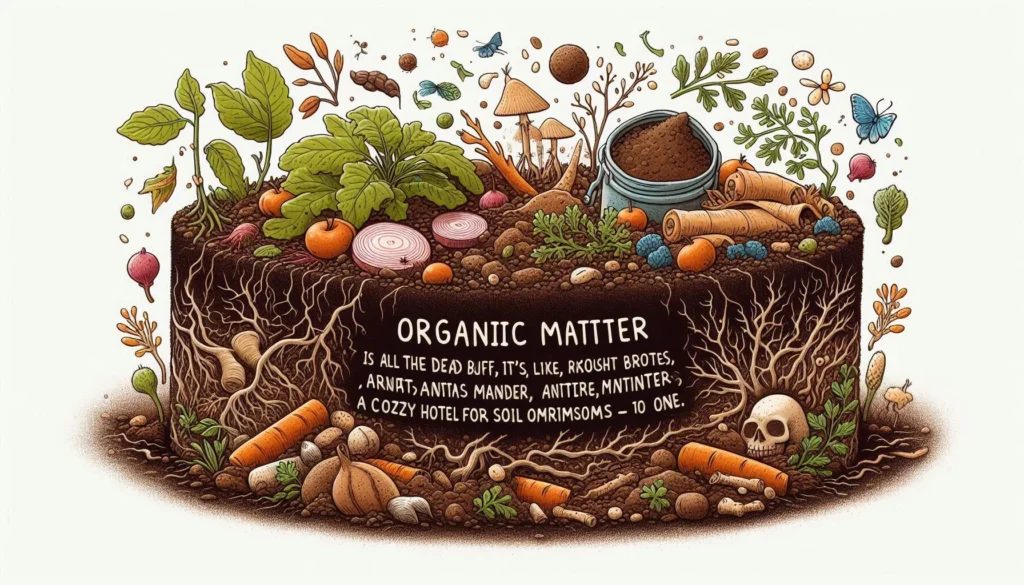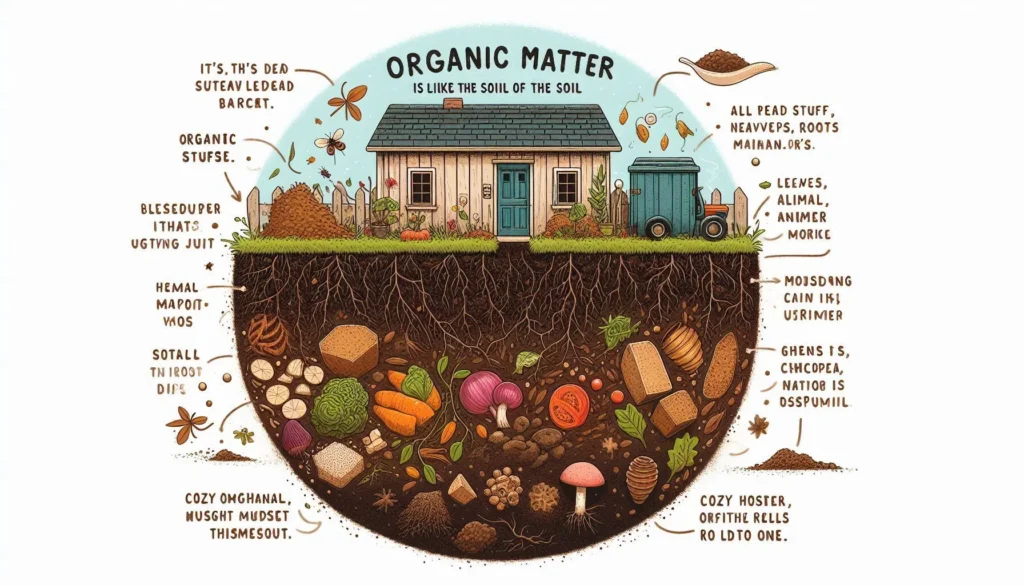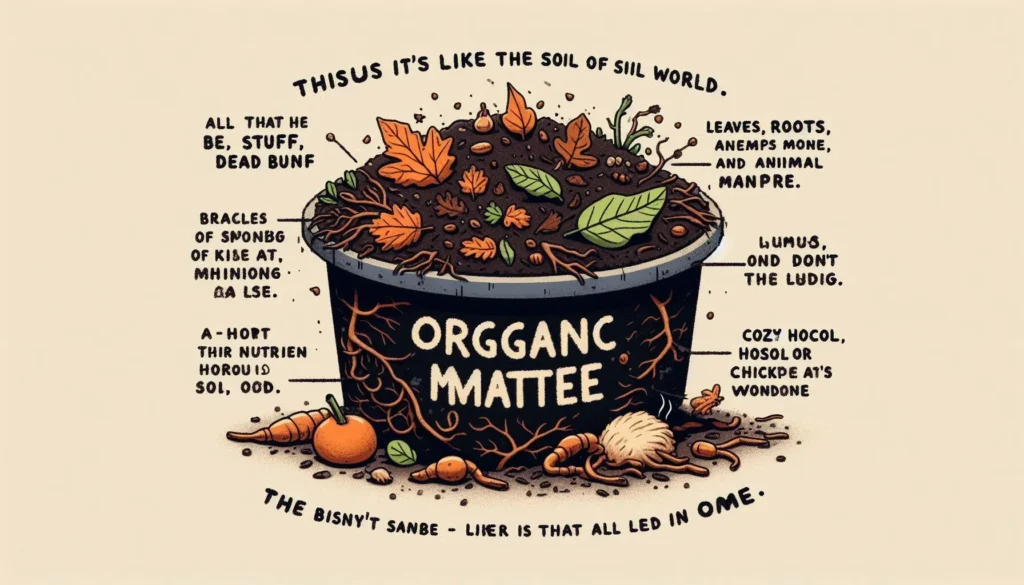Why Soil Health Matters (Hint: It’s Alive!)
Let’s start with a simple truth: soil isn’t just dirt. It’s a buzzing, breathing ecosystem teeming with life. Think of it like a bustling city underground, where roots, worms, fungi, and bacteria work together to keep plants healthy. But just like any city, it needs good infrastructure. Enter organic matter—the unsung hero of fertile soil.

In this post, we’ll dig into how decomposed plant scraps, manure, and even yesterday’s coffee grounds transform soil into a powerhouse for organic farming. But we’ll also tackle the challenges—because let’s face it, even superheroes have weaknesses.
What Exactly Is Organic Matter?
Organic matter is like the compost bin of the soil world. It’s all the dead stuff—leaves, roots, animal manure, and even tiny microbes—that breaks down into a dark, crumbly substance called humus. This isn’t the same as the chickpea dip (though both are earthy and wonderful). Humus acts like a sponge, a nutrient bank, and a cozy hotel for soil organisms—all rolled into one.
But here’s the kicker: only about 1-5% of most soils is organic matter. Yet, that tiny fraction makes all the difference between a thriving farm and a struggling one.

The Superpowers of Organic Matter
Nutrient Availability: The Ultimate Recycling Program
Plants are picky eaters. They need nitrogen, phosphorus, potassium, and a buffet of micronutrients to grow. Organic matter acts like a slow-release fertilizer, unlocking these nutrients as it decomposes.
Here’s how it works: microbes munch on organic matter, converting it into plant-friendly nutrients through a process called mineralization. For example, studies show that 70% of the nitrogen in corn crops comes from decomposed organic matter—not synthetic fertilizers (European Commission, 2016).
But unlike synthetic fertilizers, organic matter doesn’t cause nutrient runoff. It’s like a savings account for your soil—steady, reliable, and eco-friendly.
Soil Structure: Building the Perfect Home for Roots
Ever tried growing carrots in concrete? That’s what compacted soil feels like to plants. Organic matter fixes this by acting as a natural glue, binding soil particles into crumbly aggregates. These tiny clumps create space for air, water, and roots to move freely.
Better soil structure means:
- Less erosion during heavy rains.
- Stronger root systems.
- Improved drainage, so roots don’t drown in soggy soil.
Water Retention: Nature’s Sponge
In a world where droughts are becoming more common, organic matter is a game-changer. Just 1% more organic matter allows soil to hold 20,000 gallons more water per acre (NSW DPI, 2022).
This “sponge effect” means crops survive dry spells, and farmers save money on irrigation. Plus, it reduces flooding by slowing water runoff.

Microbial Metropolis: Keeping the Underground Workforce Happy
Healthy soil is crawling with life—bacteria, fungi, earthworms, and nematodes. These tiny workers:
- Break down organic matter into nutrients.
- Suppress diseases by outcompeting harmful pathogens.
- Create “microbial glue” that stabilizes soil structure (Rodale Institute, 2021).
But here’s the catch: these microbes need a steady supply of organic matter to thrive. No organic snacks? The microbial workforce goes on strike.
Carbon Sequestration: Fighting Climate Change from the Ground Up
Organic matter is basically carbon stored underground. By building healthy soils, farmers can pull CO₂ out of the atmosphere and lock it into the earth. According to the FAO, increasing organic matter by 0.4% annually could offset 20-35% of global greenhouse gas emissions (FAO, 2017).
That’s right—your compost pile is a climate action tool.
The Flip Side: Challenges of Organic Matter Management
Before you start dumping banana peels everywhere, let’s talk about realities. Organic matter isn’t a magic bullet—it has its quirks.
- Slow Results: Unlike synthetic fertilizers, organic matter takes time to break down. Farmers in a hurry might get impatient.
- Variable Quality: Not all compost is created equal. Manure contaminated with antibiotics? Yikes.
- Cost and Labor: Hauling compost or growing cover crops requires resources. Small farms might struggle.
- Nutrient Imbalances: Too much carbon-heavy material (like straw) can tie up nitrogen, starving plants.
But here’s the silver lining: these challenges are manageable with planning.

High vs Low Organic Matter Soils: A Side-by-Side Look
| Characteristic | High Organic Matter Soil | Low Organic Matter Soil |
|---|---|---|
| Water Retention | Holds moisture like a sponge | Dries out quickly |
| Nutrient Availability | Slow-release, balanced nutrients | Relies on synthetic fertilizers |
| Microbial Activity | Thriving, diverse ecosystem | Limited, sluggish activity |
| Erosion Resistance | Strong aggregates resist erosion | Prone to washing/blowing away |
| Carbon Storage | High (climate-friendly!) | Low (missed opportunity) |
How to Boost Organic Matter in Your Soil
Ready to get your hands dirty? Here’s how to level up your soil game:
- Compost Like a Pro: Turn kitchen scraps and yard waste into black gold.
- Plant Cover Crops: Clover, rye, and vetch protect soil and add organic matter when tilled under.
- Reduce Tillage: Less disturbance = more organic matter stays intact.
- Rotate Crops: Diverse plants feed different microbes.
For a deep dive, check out SARE’s guide to Building Soils for Better Crops.
Conclusion: Working With Nature’s Blueprint
Organic matter isn’t just a farming trend—it’s the foundation of life on land. Yes, it requires patience and know-how, but the rewards (better yields, climate resilience, and lower costs) are worth it.
So next time you see a pile of leaves or a herd of earthworms, give them a nod. They’re the quiet custodians of the soil, turning death into life, one speck of humus at a time.

Your Turn: Start small. Try composting kitchen scraps or plant a cover crop this season. Your soil—and the planet—will thank you.
Got questions? Drop them in the comments below! Let’s grow this conversation. 🌱


